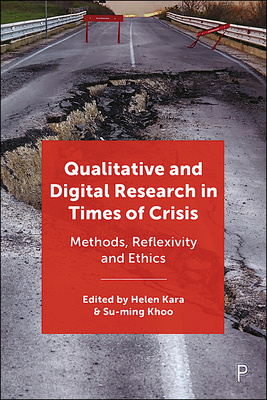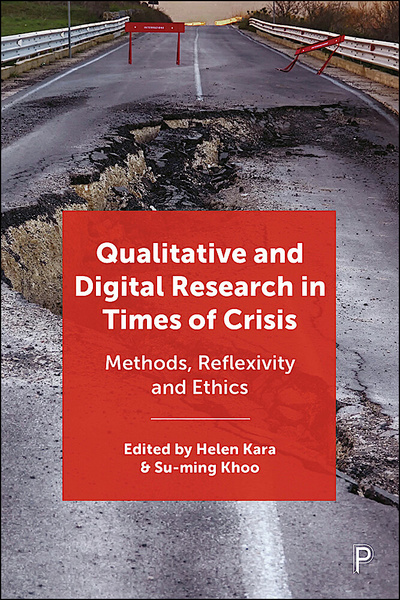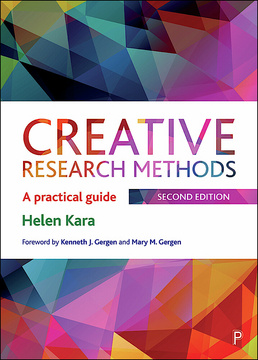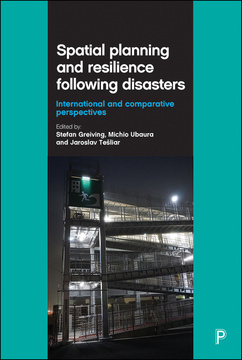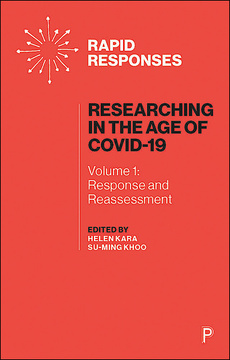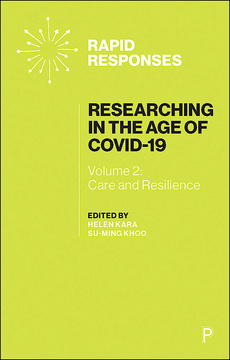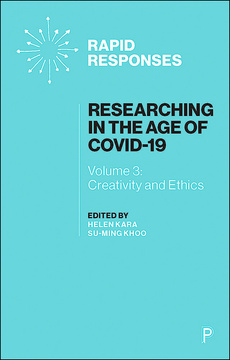Qualitative and Digital Research in Times of Crisis
Methods, Reflexivity, and Ethics
Edited by Helen Kara and Su-ming Khoo
Published
Apr 12, 2023Page count
272 pagesISBN
978-1447363804Dimensions
234 x 156 mmImprint
Policy PressPublished
Nov 29, 2021Page count
272 pagesISBN
978-1447363798Dimensions
234 x 156 mmImprint
Policy PressPublished
Nov 29, 2021Page count
272 pagesISBN
978-1447363811Dimensions
234 x 156 mmImprint
Policy PressPublished
Nov 29, 2021Page count
272 pagesISBN
978-1447363811Dimensions
234 x 156 mmImprint
Policy PressCrises such as the COVID-19 pandemic, disasters, or violent conflict present numerous challenges for researchers. Faced with disruption, obstacles, and even danger to their own lives, researchers in times of crisis must adapt or redesign existing research methods in order to continue their work effectively.
Including contributions on qualitative and digital research from Europe, Asia, Africa, Australasia, and the Americas, this volume explores the creative and thoughtful ways in which researchers have adapted methods and rethought relationships in response to challenges arising from crises. Their collective reflections, strategies, and practices highlight the importance of responsive, ethical, and creative research design and the need to develop methods for fostering mutual, reflexive, and healthy relationships in times of crisis.
“In a rapidly changing research environment, this is a needed and thought-provoking research methods book. For those undertaking research during times of crisis, this book provides guidance and prompts reflection.” Sarita Robinson, University of Central Lancashire
“This volume is a welcome resource for researchers working in crises. I particularly liked how ethics was infused throughout the whole book, exemplifying how ethical decision-making happens throughout the research process, especially during crises.” Dónal O'Mathúna, Ohio State University
Helen Kara has been an independent researcher since 1999 and specialises in creative research methods and ethics.
Su-ming Khoo is Senior Lecturer in Political Science and Sociology at the National University of Ireland, Galway. She specialises in critical development studies, human rights, higher education and decolonial and transdisciplinary approaches.
Introduction - Su-ming Khoo and Helen Kara
Part 1: Reflexivity and ethics
1. Just because you can, doesn’t mean you should - Ali FitzGibbon
2. Ethnography in crisis: methodology in the cracks - Zania Koppe
3. Phenomenology of lived experience: multilayered approach and positionality - Bibek Dahal
Part 2: Arts-based approaches
4. The arts of making-sense in uncertain times: arts-based research and autoethnography - Deborah Green, Amanda Levey, Bettina Evans,
Wendy Lawson, and Kathrin Marks
5. Practice-based research in times of crisis: weaving community together during lockdown - Gretchen Stolte and Lisa Oliver
6. Communicating crisis research with comics: representation, process, and pedagogy - Gemma Sou and Sarah Marie Hall
Part 3: Digital methods
7. Developing a Collaborative AutoNetnographic approach to researching doctoral students’ online experiences - Richard McGrath, Holly Bowen-Salter, Emma Milanese, and Phoebe Pearce
8. The ethical implications of using digital traces: studying explainability and trust during a pandemic - Natasha Dwyer, Hector Miller-Bakewell, Tessa Darbyshire, Anirban Basu, and Steve Marsh
9. The use of objects to enhance online social research interviews - Maged Zakher and Hoda Wassif
10. Qualitative data re-use and secondary analysis: researching in and about a crisis - Anna Tarrant and Kahryn Hughes
11. Researching older Vietnam- born migrants at a distance: the role of digital kinning - Hien Thi Nguyen, Loretta Baldassar, Raelene Wilding, and Lukasz Krzyzowski
Part 4: Recurring and longer-term crises
12. A timed crisis: Australian education, migrant Asian teachers, and critical autoethnography - Aaron Teo
13. Building relationships and praxis despite persistent obstacles - Maria Grazia Imperiale
14. Managing ethical tensions when conducting research in fragile and conflict-affected contexts - Gbenga Akinlolu Shadare
15. Beyond extraction: co-creating a decolonial and feminist research practice in post-conflict Guatemala - Aisling Walsh
Conclusion - Helen Kara and Su-ming Khoo







